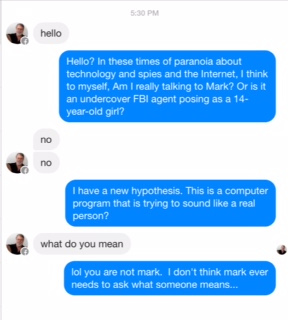mark.liberman.121 is not me
« previous post | next post »
Earlier today, someone set up a Facebook account https://www.facebook.com/mark.liberman.121, with a version of my FB profile picture, and began communicating with people as if they were me. My actual FB page is https://www.facebook.com/mark.liberman, which I don't use much except to look at things that people tell me about.
This is apparently a phishing enterprise. The impostor asks people for their phone number and email address and postal address — at least one person gave them this much information — and eventually gets around to money.
There are two interesting things about this situation. The first is that Facebook's mechanism for reporting impostors is broken, in an interesting way:
(1) Anyone can report an impostor, but only the person being impersonated can make a claim that is likely to get action.
(2) Reporting an impostor is in principle easy — just click on the three dots at the right of the impostor's profile page, and follow the menu trail from there.
(3) But in this case, the impostor has blocked me, so that I'm unable to get to their profile page to perform action (2).
(4) I tried to report the impostor by pretending not to have a Facebook account, but the FB site immediately recognized this as false, and instructed me to use my FB account to perform action (2).
(5) I took more serious steps to hide my (FB) identity before reporting the impostor, but the FB site informed me sternly that they need a report from the person being impersonated, and closed the case.
(6) I clicked on the "reopen the case" link, and have gotten three successive messages telling me that I need to send them various pieces of information. Each time, I send the requested information, and get a response that says, essentially, "we're looking into it, but for us to do this we need you to send us the following information — which I just sent them in response to the two previous versions of the same message.
This must be a fairly common form of phishing — certainly it seems to be relatively successful — so you'd think that FB could deal with it in a way that is not so trivial for the criminals to defeat. I'll send updates as the situation develops (if it does).
The second interesting thing about about this case is that most of the people the impostor contacted — there are apparently about 40-50 of them so far — were not fooled. And in one case, the recipient became suspicious after getting a one-word message. Now that's text classification!

Here's a segment of another person's interaction, in which the financial aspect of the scam appears:

Hannah said,
January 31, 2015 @ 12:03 am
I'm a long-time reader of this blog who also works in content moderation at Facebook. First of all, I'm sorry for the terrible reporting experience you had; it's something we're aware of and will be actively working on in the next few months. Second of all, I'll pass this on internally to make sure the account gets removed.
[(myl) Thanks!]
Mark Mandel said,
January 31, 2015 @ 1:20 am
I've reported the impostor, and I've sent the following Message to, I think, all the people listed as its friend:
Mark.Liberman.121 is a fake. See http://languagelog.ldc.upenn.edu/nll/?p=17442
Unfortunately on the first few I misremembered the number as 128, but I think the point will get through.
Jeroen Mostert said,
January 31, 2015 @ 3:56 am
"You are not Mark. I don't think Mark ever needs to ask what someone means" must be the nicest compliment by way of third-party insult since "senator, you're no Jack Kennedy".
Eric P Smith said,
January 31, 2015 @ 6:15 am
@Mark Mandel
Off topic, but your confusion of 121 and 128 is fascinating to me as a mathematician. 121 is a square and 128 is a power of 2. 121 is one of a surprisingly large set of squares that are 7 less than a power of 2. 1=8-7; 9=16-7; 25=32-7; 121=128-7; 32761=32768-7.
Josef Fruehwald said,
January 31, 2015 @ 7:56 am
I just got a follow up message from facebook about my report telling me that they haven't removed the profile, and that they were following up with "Mark Liberman" to "make sure they know about the Facebook Community Standards."
[(myl) Interesting that transparent fraud with apparent intent to steal money is treated as a case where FB needs to check whether the criminal knows about "Facebook Community Standards"… Though perhaps this is a euphemism, along the lines of what drill sergeants used to call an "attitude adjustment".]
Neal Goldfarb said,
January 31, 2015 @ 8:11 am
Hello.
Acilius said,
January 31, 2015 @ 9:50 am
@Neal Goldfarb: No.
bratschegirl said,
January 31, 2015 @ 12:29 pm
Searching Facebook for a profile identified thus just now yielded "Sorry, we couldn't find any results for this search."
Pflaumbaum said,
January 31, 2015 @ 2:34 pm
I wonder whether your average "X and I" prescriptivist would want this post to be entitled Mark.Liberman.121 is not I?
One of the contexts where nominative me holds sway, along with the 8 or 10 syntactic ones identified by CGEL, seems to be a semantic one: where you are referring to your own identity almost as if it were a separate person… almost, if you'll forgive the confusing terminology, 'objectively'.
For instance, pointing at a picture/photo of yourself and saying "That's me when I was in the French Foreign Legion." It's hard to imagine even someone who favours I in, say, it-cleft clauses, saying "That's I when I was in the French Foreign Legion".
Coby Lubliner said,
January 31, 2015 @ 2:49 pm
I enjoyed Mark's consistent and unapologetic use of singular they throughout the post. I am unsure about the spelling imposter, and very doubtful about sargent.
[(myl) OK, I've backed down and restored the traditional orthography for both.]
Vasha said,
January 31, 2015 @ 2:55 pm
A friend of mine had a similar scam practised in her name: someone hacked her email account and sent messages to her address book saying 'I'm stranded in [distant country] with my wallet stolen, please send money.' The problem? The imposters didn't know that my friend is very far from a native speaker of English and sent perfectly grammatical messages– the opposite of the scammer's usual problem discussed so often in these pages!
Q. Pheevr said,
January 31, 2015 @ 2:57 pm
I've been reading Language Log for several years through an RSS feed that generally shows me the full text of each post, but not the byline. Sometimes I'll try to guess who wrote the post before coming here to check my answer (and to read the comments, if it's not Geoff Pullum). So I have a fair bit of informal experience in text classification of the Mark-Liberman-or-not variety (and a respectable though certainly not perfect success rate), and I can say with some confidence that "mark.liberman.121" in the short excerpts above is much easier to distinguish from Mark Liberman than any of the other Language Log contributors are. In fact, I'm not sure mark.liberman.121 could pass a Turing test.
In any case, I hope Hannah and her colleagues succeed in eliminating the catch-22 from the imposter-reporting process.
Q. Pheevr said,
January 31, 2015 @ 3:08 pm
@Coby Lubliner: Both imposter and impostor are standard, but I can see why you would give short shrift to sargent (if you're not a sargent-shriver).
Bobbie said,
January 31, 2015 @ 3:10 pm
I carried on a conversation with a "friend" for a while before I realized it was a scam and I had friended her twice. The fake (scam) account did offer me a chance to obtain some money.
The only problem was trying to explain to a few of my not-very-tech-savvy friends which friend to delete.
Sally Thomason said,
January 31, 2015 @ 3:19 pm
Mark, I got that impostor's fake friend request too, and then a one-word message saying hello and a second one saying how are you? Then I wrote a message saying If you are really Mark Liberman, please tell me what the topic was of a CLS paper you gave with Ivan Sag back in the 1970s. Strangely enough, I got no response to that query. (I don't remember the exact topic of the paper either, I must admit — it had something to do with intonation, though, and there were wonderful example sentences about whales.)
lhc said,
January 31, 2015 @ 3:32 pm
Surely I'm not the only person who doesn't believe @Hannah is real, but is a bot.
Piyush said,
January 31, 2015 @ 6:04 pm
I and two of my friends were targeted simultaneously by such a scam once (why I would never know). The modus operandi was similar: the impersonator(s) took care to block us, and sent messages to other people on our contact lists, some of whom alerted me to the scam. Even in that case, Facebook's handling of the reporting procedure left something to be desired. However, as far as I recall, it was possible for people on my friends list to report the impersonators, and Facebook seemed to put a higher weight on these third party reports.
Hannah said,
February 1, 2015 @ 1:45 am
lhc, probably not; it's certainly not the first time I've been accused of being a bot in the course of my work, and probably won't be the last. I can pass a Turing test for you, but then again, who can't these days?
V said,
February 1, 2015 @ 4:36 am
Q. Pheevr: anything other than sergeant looks strange to me.
Mark S said,
February 1, 2015 @ 9:55 am
V: My spelling is pretty good, and I can even spell "sergeant"; but I always have to look at it afterwards and think, "Did I put that extra 'a' in the right place, and is it really a 'g', not a 'j'?"
Mark S said,
February 1, 2015 @ 9:57 am
@Hannah: Who would have thought that posting a Facebook scam on Language Log would get a better response than reporting it to Facebook directly? :-)
Robert Coren said,
February 1, 2015 @ 11:31 am
If "imposter" is standard, it has become so in the last, oh, 55 years or so. My mother insisted that an "imposter" was someone involved in the levying or collection of a tax (or impost). On the other hand, MW online has no such sense, and only includes "imposter" as a variant of "impostor".
I commonly see the spelling with e, but it still bothers me, all these years later.
Joe said,
February 2, 2015 @ 1:08 pm
"You are not Mark. I don't think Mark ever needs to ask what someone means"
I think it's time to generate Mark Liberman Facts (in the style of Chuck Norris Facts): "Mark Liberman never needs to ask what anyone means" or "Mark Liberman is badass that the put deconstructionists in an alternate universe" or "Mark Liberman will kick your ass by decreasing your definiteness".
Needs work, I know – but maybe yall can do better.
Mark Mandel said,
February 2, 2015 @ 10:22 pm
@Eric P Smith: I've been an amateur math geek all my life. It didn't occur to me that 121=11², but 128 and the other powers of 2 up to about 4096 are prominent in my everyday musings, and I'm sure that's why I erred to 2⁷.
Karl Weber said,
February 3, 2015 @ 6:47 am
@MarkS: the mnemonic device I learned as a kid was to picture an ANT in a blue SERGE suit.
Yuval said,
February 6, 2015 @ 1:36 am
@Joe: start with this:
https://twitter.com/fakechomsky/status/9235218525